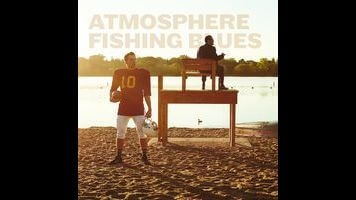On Fishing Blues, Atmosphere has crafted its most (cautiously) optimistic album yet

To understand the worldview of Atmosphere’s Fishing Blues, look no further than the title; piscine imagery pops up several times throughout the album. In “Besos,” a cokehead earns the nickname “Blowfish” because his drug habit keeps him from getting it up. Three songs later in “Seismic Waves,” a school of salmon tries to swim upstream in The River Of Pessimism. Finally, on the title track featuring Oakland rapper The Grouch, fishing becomes a means of meditating one’s way through their own hardships. When a fish darts away with Slug’s bait, the loss doesn’t bother him.
All three instances are examples of people (or fish as people/people as fish) fighting to swim against the current, to overcome the obstacles in their lives, to persevere—a verb that Slug himself has noted as being a running theme in his work. Sometimes folks are able to get what they want—whether it be love, sex, sobriety, or just a small moment of happiness—and sometimes they’re not. All that matters is that they tried.
As with any recent Atmosphere release, this message of cautious optimism (or maybe it’s just realism) rings loud and clear, thanks to the sonic clarity of the veteran hip-hop duo. Slug’s easily decipherable flow and why-didn’t-I-think-of-that similes are almost defiant in their simplicity (“I feel faded like an old-ass flashlight,” “Dirty like the wheels on a dump truck,” and so on), then made even more accessible by Ant’s production. Increasingly interested in warmth rather than the frigidity found in the group’s older material, the beatmaker embraces some of the most inviting elements of classic rock in his arrangements, mixing turntable scratches with choral harmonies on opener “Like A Fire” and incorporating folkish strumming, strings, and pan flute reminiscent of Astral Weeks on “Besos.”
While nearly every song sticks to the above formula for music and words, the best tracks find Slug at his most lyrically specific. Some cuts lean on the kind of imaginary character sketches heard on When Life Gives You Lemons, You Paint That Shit Gold, most notably “Pure Evil,” which analyzes the cyclical nature of police brutality from an officer’s point of view. But, in keeping with the album’s motif of (sometimes failed) improvement, the lawman shows the faintest glimmer of self-awareness toward the end, recognizing the institutionalization of violence within certain cops. Although the line “I was told to tell a one-sided story” doesn’t exactly confirm that he’ll change his ways or hang up his badge—even if the recently released music video says otherwise—he at least realizes that a huge part of the problem comes from within the police force.
Other songs do away with fiction altogether in favor of the autobiographical roots planted on 2014’s Southsiders, all while still playing like short stories. The hangover victim in “Ringo” could be a composite of Slug’s nightlife experiences and industry travails as a mid-level musician. Likewise, it’s easy to imagine him as the drunken narrator of “Next To You,” where he arrives home too late to have sex with his pregnant wife, then passes out before he can jerk off. In another rapper’s hands, it might be standard baby-making music, but under the pen of Slug, it’s a slow-jam tale of loserdom that’s distinct for its grossness, self-deprecation, and dark sense of humor.
Toward the back half of the album, he becomes less concerned with narrative and more focused on positive sloganeering. The harpsichord-heavy “Won’t Look Back” and “Anybody That I’ve Known” are more or less affirmations of his life choices so far, and on “Still Be Here,” he looks toward the future. While still musically lush, the three-song stretch lacks the verbal detail exhibited on the rest of the LP, making one wonder if Fishing Blues would have a little more momentum at 15 rather than 18 songs. But overall, this is undeniable rap therapy. Like the rest of us, Slug and Ant are just trying to get by, and for the most part, they’re succeeding.
Purchasing this album via Amazon helps support The A.V. Club.